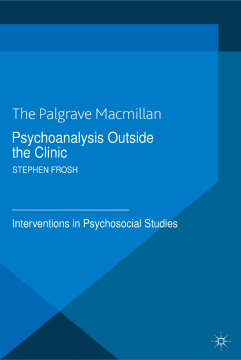
Additional Information
Book Details
Abstract
More than a hundred years after its founding, psychoanalysis remains influential and controversial far outside its core sphere of activity in the 'clinic'. In a wide range of cultural and social disciplines, psychoanalytic ideas are drawn on to explain human subjectivity and its relationship with the social world.
This lucid and engaging book explores these interventions through detailed examination of how psychoanalytic ideas apply in literature, politics, social psychology, philosophy and psychosocial studies. The highly-regarded and influential author, Stephen Frosh, shows how psychoanalysis can at times greatly illuminate these fields of study, and how at other times it might misread them. He also asks what psychoanalysis can learn from the disciplines with which it is in dialogue, and particularly how it can retain its own capacity for critical thought.
Sophisticated and stimulating, yet accessible and approachable, this important book:
• provides a critical exploration that will stimulate further debate about the place of psychoanalysis in intellectual life
• develops the newly emerging psychosocial perspective as one that links psychological and social theories in novel ways.
Psychoanalysis Outside the Clinic will be of profound interest to students and academics across a wide range of disciplines, particularly those taking courses in social, cultural or political theory at undergraduate or postgraduate level or studying on programmes in Psychoanalytic or Psychosocial Studies.
STEPHEN FROSH is Professor of Psychology and Pro-Vice-Master at Birkbeck College, University of London, UK. He is also Co-Director of of the Birkbeck Institute for Social Research. He is widely published, and is particularly well-known for his lucid accounts of psychoanalysis. His books include: For and Against Psychoanalysis (2006), Key Concepts in Psychoanalysis (2002) and The Polotocs of Psychoanalysis (1999).
'...an indispensable guide to existing interdisciplinary efforts.' - Pschoanalysis, Culture & Society
Table of Contents
| Section Title | Page | Action | Price |
|---|---|---|---|
| Cover | Cover | ||
| Half-Title | i | ||
| Title | iii | ||
| Copyright | iv | ||
| Contents | v | ||
| 1 The Applications and Implications of Psychoanalysis | 1 | ||
| Psychoanalysis in and outside the clinic | 1 | ||
| Psychoanalysis as social critique | 6 | ||
| Normalising tendencies inside the clinic | 13 | ||
| Constructions of psychoanalysis as a colonising science | 17 | ||
| Areas of psychoanalytic influence in the arts and social sciences | 22 | ||
| The examples of law and sexual difference | 24 | ||
| Types of psychoanalysis | 30 | ||
| Psychoanalysis in the social sciences: a psychosocial approach | 36 | ||
| 2 Freud on Art, Culture and Society | 40 | ||
| Culture on the couch | 41 | ||
| Pillaging art | 43 | ||
| Biographical psychobabble: Leonardo’s sexuality | 48 | ||
| Using literature to validate psychoanalysis: the example of Jensen’s Gradiva | 52 | ||
| Learning from love | 57 | ||
| Social Freud: the case of religion | 59 | ||
| Conclusion | 67 | ||
| 3 Psychoanalysis as/of Literature | 69 | ||
| Problems of character and interpretation | 70 | ||
| Psychoanalysis 'and' … | 74 | ||
| The destructive element: Kleinianism and its literary resonances | 77 | ||
| Psychoanalysis as literature | 81 | ||
| Signs and signifiers | 88 | ||
| Conclusion | 96 | ||
| 4 Psychoanalysis as Social Psychology: The Case of Identity | 98 | ||
| Identity politics | 99 | ||
| Classical psychoanalytic formulations of identity | 103 | ||
| Bodies, objects and identifications | 107 | ||
| Post-integrative identities | 113 | ||
| Relational and diasporic identities | 118 | ||
| Conclusion | 124 | ||
| 5 Recognising Others: Towards a Relational Ethics | 127 | ||
| Recognising others: lessons from relational psychoanalysis | 128 | ||
| 'I'll go first' or 'after you'? Benjamin and Levinas on ethical responsibility | 135 | ||
| Language, murmuring and silence | 138 | ||
| On ethical violence | 145 | ||
| Conclusion | 155 | ||
| 6 The Radical Politics of Psychoanalysis | 157 | ||
| Psychic colonialism and political parallels | 158 | ||
| Resistance | 164 | ||
| Subjective politics and social repression | 169 | ||
| Relationality and social conflict | 173 | ||
| Lack and enjoyment in political thought | 177 | ||
| Conclusion | 187 | ||
| 7 Psychoanalysis and the ‘Psychosocial’ | 189 | ||
| Critical psychology and psychosocial studies | 190 | ||
| Defining the psychosocial | 195 | ||
| Psychoanalysis and discourse | 199 | ||
| Types of psychoanalysis | 204 | ||
| Reflexivity, countertransference and psychosocial research | 209 | ||
| Conclusion | 216 | ||
| Conclusion: Reflexivity Outside the Clinic | 219 | ||
| Re-view | 219 | ||
| Reflexive Practice | 222 | ||
| References | 225 | ||
| Index | 237 |
